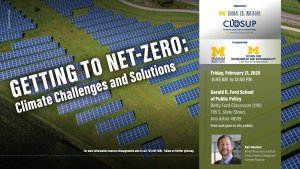Presented By: Center for Local, State, and Urban Policy (CLOSUP)
Getting to Net-Zero: Climate Challenges and Solutions
Karl Hausker Senior Fellow, Energy and Climate Program, World Resources Institute

GLOBAL CO2 INITIATIVE
CENTER FOR LOCAL, STATE, AND URBAN POLICY (CLOSUP)
presents
Getting to Net-Zero: Climate Challenges and Solutions
Karl Hausker Senior Fellow, Energy and Climate Program, World Resources Institute
Gerald R. Ford School of Public Policy, Betty Ford Classroom (1110)
735 S. State Street, Ann Arbor 48109-3091
11:45am-12:50pm (Pizza lunch available at 11:30am, talk begins at 11:45am)
Free and open to the public.
Pizza Lunch served at 11:30am.
Talk starts at 11:45am.
Description: Climate change is back on the national agenda with hearings, bills introduced, candidates’ plans, and discussion of a Green New Deal. Many policymakers are embracing the goal of net-zero emissions by 2050. Vigorous debates are occurring over questions including:
• Can renewables supply 100% of US electricity? 100% of all energy?
• What role should existing nuclear plants play in a clean energy economy? New nuclear plants?
• What role should carbon capture and storage play?
• How fast should the US aim to transition to 100% clean energy? What are the key policy levers that could achieve this?
• What roles should states, cities, and companies play in the clean energy transition?
Analysis and modeling of clean energy pathways can throw light on these questions. Everyone in the climate/energy policy community should understand how assumptions regarding the availability, performance, and integration of various technologies drive the energy, environmental and economic implications of pathways to deep reductions in emissions. Implications for energy policy and R&D portfolios are also critical.
Dr. Karl Hausker leads analysis and modeling of climate mitigation, electricity market design, and the social cost of carbon. He led the Risky Business study of clean energy scenarios for the U.S., and lectures widely on deep decarbonization. He has led climate policy analysis and modeling projects for USAID, USEPA, the Regional Greenhouse Gas Initiative, the Western Climate Initiative, and the California Air Resources Board. Much of his work has focused on the energy and transportation sectors, and on low carbon, climate resilient development strategies. From 2007-2013, Karl was a Vice President at ICF International. His experience also includes: serving President Clinton as Deputy Assistant Administrator in EPA’s Policy Office where he represented EPA in interagency climate policy development and at COP-1; and serving as the Chief Economist for the U.S. Senate Committee on Energy and Natural Resources, where he worked on a diverse set of issues including electricity restructuring, CAFE standards, alternative fuels, western water policy, nuclear power, and energy security. Karl holds an M.P.P and Ph.D. in Public Policy from University of California, Berkeley, and received his Bachelor’s degree in Economics from Cornell University.
Sponsored by: The University of Michigan Center for Local, State, and Urban Policy (CLOSUP) and Global CO2 Initiative
Co-sponsors: University of Michigan School for Environment and Sustainability (SEAS), Graham Sustainability Institute, and Center for Sustainable Systems
For more information contact closup@umich.edu or call 734-647-4091.
CENTER FOR LOCAL, STATE, AND URBAN POLICY (CLOSUP)
presents
Getting to Net-Zero: Climate Challenges and Solutions
Karl Hausker Senior Fellow, Energy and Climate Program, World Resources Institute
Gerald R. Ford School of Public Policy, Betty Ford Classroom (1110)
735 S. State Street, Ann Arbor 48109-3091
11:45am-12:50pm (Pizza lunch available at 11:30am, talk begins at 11:45am)
Free and open to the public.
Pizza Lunch served at 11:30am.
Talk starts at 11:45am.
Description: Climate change is back on the national agenda with hearings, bills introduced, candidates’ plans, and discussion of a Green New Deal. Many policymakers are embracing the goal of net-zero emissions by 2050. Vigorous debates are occurring over questions including:
• Can renewables supply 100% of US electricity? 100% of all energy?
• What role should existing nuclear plants play in a clean energy economy? New nuclear plants?
• What role should carbon capture and storage play?
• How fast should the US aim to transition to 100% clean energy? What are the key policy levers that could achieve this?
• What roles should states, cities, and companies play in the clean energy transition?
Analysis and modeling of clean energy pathways can throw light on these questions. Everyone in the climate/energy policy community should understand how assumptions regarding the availability, performance, and integration of various technologies drive the energy, environmental and economic implications of pathways to deep reductions in emissions. Implications for energy policy and R&D portfolios are also critical.
Dr. Karl Hausker leads analysis and modeling of climate mitigation, electricity market design, and the social cost of carbon. He led the Risky Business study of clean energy scenarios for the U.S., and lectures widely on deep decarbonization. He has led climate policy analysis and modeling projects for USAID, USEPA, the Regional Greenhouse Gas Initiative, the Western Climate Initiative, and the California Air Resources Board. Much of his work has focused on the energy and transportation sectors, and on low carbon, climate resilient development strategies. From 2007-2013, Karl was a Vice President at ICF International. His experience also includes: serving President Clinton as Deputy Assistant Administrator in EPA’s Policy Office where he represented EPA in interagency climate policy development and at COP-1; and serving as the Chief Economist for the U.S. Senate Committee on Energy and Natural Resources, where he worked on a diverse set of issues including electricity restructuring, CAFE standards, alternative fuels, western water policy, nuclear power, and energy security. Karl holds an M.P.P and Ph.D. in Public Policy from University of California, Berkeley, and received his Bachelor’s degree in Economics from Cornell University.
Sponsored by: The University of Michigan Center for Local, State, and Urban Policy (CLOSUP) and Global CO2 Initiative
Co-sponsors: University of Michigan School for Environment and Sustainability (SEAS), Graham Sustainability Institute, and Center for Sustainable Systems
For more information contact closup@umich.edu or call 734-647-4091.